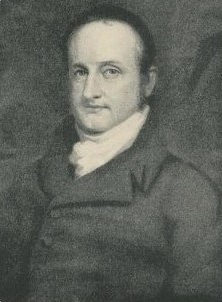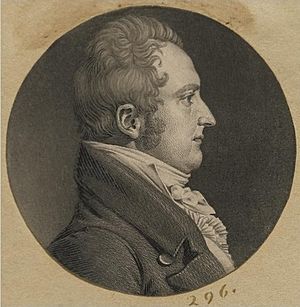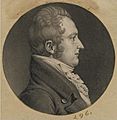William P. Van Ness facts for kids
Quick facts for kids
William P. Van Ness
|
|
|---|---|
 |
|
| Judge of the United States District Court for the Southern District of New York | |
| In office April 9, 1814 – September 6, 1826 |
|
| Appointed by | operation of law |
| Preceded by | Seat established by 3 Stat. 120 |
| Succeeded by | Samuel Betts |
| Judge of the United States District Court for the District of New York | |
| In office May 27, 1812 – April 9, 1814 |
|
| Appointed by | James Madison |
| Preceded by | Seat established by 2 Stat. 719 |
| Succeeded by | Seat abolished |
| Personal details | |
| Born |
William Peter Van Ness
February 13, 1778 Claverack, New York |
| Died | September 6, 1826 (aged 48) New York City, New York |
| Resting place | Green-Wood Cemetery Brooklyn, New York |
| Political party | Democratic-Republican |
| Spouse |
Anne McEvers
(m. 1800–1826) |
| Children | 5 |
| Relatives | John Peter Van Ness (brother) Cornelius P. Van Ness (brother) James Van Ness (nephew) |
| Education | Columbia University |
| Occupation | Attorney |
William Peter Van Ness (born February 13, 1778 – died September 6, 1826) was an important American judge. He served as a federal judge in New York. He is also known for being a close friend and helper to Aaron Burr during Burr's famous duel with Alexander Hamilton.
Contents
Early Life and Education
William Peter Van Ness was born in Claverack, New York, in 1778. He went to Columbia College, which is now part of Columbia University. He graduated in 1797. After college, he studied law with a lawyer named Edward Livingston. By 1800, he was ready to practice law himself.
He worked as a lawyer in New York City for a short time. In 1801, he helped write changes to New York's state constitution. He then practiced law in other New York cities like Albany and Hudson, before returning to New York City.
Future President as a Student
A very famous person, Martin Van Buren, studied law in William Van Ness's office. This happened in 1802. Martin Van Buren later became the eighth President of the United States.
Friendship with Aaron Burr
William Van Ness was a good friend of Aaron Burr. Burr was a well-known politician at the time. Van Ness strongly supported Burr and Thomas Jefferson in the 1800 presidential election.
In that election, Burr and Jefferson received the same number of votes. This meant the United States House of Representatives had to choose the winner. Some politicians wanted Burr to become president instead of Jefferson. Van Ness secretly supported this idea, but in the end, Jefferson became president, and Burr became vice president.
The Famous Duel
In July 1804, William Van Ness was involved in a very famous event: the Burr–Hamilton duel. He acted as Aaron Burr's "second." In a duel, a "second" was a trusted helper who made sure the rules were followed. Van Ness helped prepare the pistols for the duel between Burr and Alexander Hamilton. He was there when Burr shot Hamilton.
Becoming a Federal Judge
President James Madison chose William Van Ness to be a federal judge in 1812. He became a judge for the United States District Court for the District of New York. Two years later, in 1814, his job changed slightly. He was reassigned to a new court, the United States District Court for the Southern District of New York. He served as a judge until he passed away in 1826 in New York City. He was buried in Green-Wood Cemetery in Brooklyn.
Court Investigations
During his time as a judge, there were some investigations related to his court.
In 1818, the court clerk, Theron Rudd, was accused of taking a lot of money that belonged to the court. Rudd ran away with the money, but he was later caught and punished. Investigators looked into whether Judge Van Ness or another judge, Matthias B. Tallmadge, were involved. They found that the judges were not part of the theft. However, they might have been too relaxed in watching over the clerk.
Also in 1818, a special group in Congress looked into how well Judge Van Ness and Judge Tallmadge were doing their jobs. The two judges did not work well together. This was one reason why New York's federal court was split into two separate districts in 1814. The investigation found that Judge Tallmadge sometimes missed court dates, but this was not a reason to remove him from his job. No further action was taken against either judge.
Family Life
William Van Ness came from an important family. His father, Peter Van Ness, was a wealthy lawyer and farmer. William built a large house on his father's land in Kinderhook, New York. This house was later bought by Martin Van Buren and is now a historic site called Lindenwald.
William had two brothers who also became famous. John Peter Van Ness was a member of the U.S. House of Representatives and a mayor of Washington, D.C. Cornelius P. Van Ness became the Governor of Vermont.
In 1800, William Van Ness married Anne McEvers. They had five children together. Their family belonged to the Dutch Reformed Church.
Published Works
William Van Ness also wrote several books and papers about politics and law. Some of his works include:
- Examination of Charges against Aaron Burr (1803)
- The Laws of New York, with Notes (with John Woodworth, 1813)
- Reports of Two Cases in the Prize Court for New York District (1814)
- Concise Narrative of Gen. Jackson's First Invasion of Florida (1826)
Images for kids
 | Isaac Myers |
 | D. Hamilton Jackson |
 | A. Philip Randolph |




